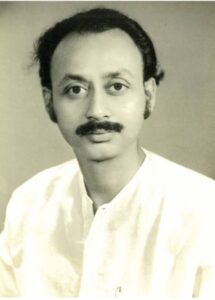
Image courtesy: Durga Prasad Panda
Tribute to the Living Legend of Indian Poetry in English
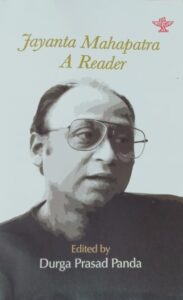
Image courtesy: Durga Prasad Panda
JAYANTA MAHAPATRA is in his nineties now. It was during the dawn of the 21st century, in 2001, that I first met the smiling blue-jeans clad poet from Cuttack Odisha. In fact, as Head, Dept of English, Calcutta University, I realized that I could in the next two years, chase certain dream targets such as organizing seminars and conferences, inviting some of the iconic figures of Indian English literature. One of the first invitees was poet Jayanta Mahapatra. I was surprised and overwhelmed by his warmth, simplicity, smiling face and his readiness to talk to all his admiring readers. I had booked his accommodation at the Ramakrishna Mission International Guest House, at Golpark in South Kolkata . He arrived around 3 pm in the afternoon, the day before the conference. As soon as I met him, I learnt from him that since the lunch hour was over, he would have to wait till the dinner time, for having some food. So, my first job was to find some food for my invitee poet who was virtually starving. Unfortunately, the Golpark area in South Kolkata in 2001, did not have many restaurants and cafes as there are now. Both of us walked into the Sutripti restaurant, the only one which seemed would be able to toss up a late lunch for my revered invitee. Poet Mahapatra, a small eater, relished the chicken sandwiches and coffee and also the fresh lime soda. As we were chatting, the outstanding Nigerian footballer Chima Okorie, who scored 131 goals for East Bengal,walked up to us. Chima Okorie was fascinated by Jayanta Mahapatra’s way of speaking English. Chima remarked that he had sensed Jayanta Mahapatra was surely an acclaimed personality. He felt attracted to poet Mahapatra because he had rarely heard a man who had such a mellifluous, flute-like voice. The poet in the blue jeans who was perhaps in his late seventies in fact looked more youthful than the renowned footballer. This has been one of the lasting impressions of Jayanta Mahapatra who spoke in our conference and read his poems with such captivating charm, that the participants followed him around as long as he was there in the Calcutta University College Street campus.
– Sanjukta Dasgupta (Prof. Sanjukta Dasgupta has taught the works of Jayanta Mahapatra for a number of years)
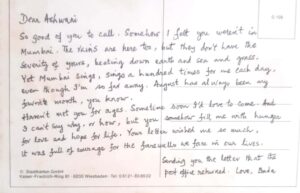
Image courtesy: Ashwani Kumar
Indisputably, Jayanta da is the most luminous and mesmerizing poet of the primal joy of mythic adventures of self and sensuality (sacred or secular). Known as wandering yaksha in Indian poetry , he is epic, even in miniature, concealed in the frighteningly intimate mysteries of life. The universal human imagination through meandering rhythm of rainclouds reveals, regales itself in his verses as the renewal of our humanity with a rage and regret. It is impossible to think of Indian poetry without him. With transgressive thrills and mischievous provocations, he has quietly and delightfully invented a uniquely personal language specific to his poetry and people. What is striking about his poetic resonance or dhvani is the exceptional intensity of rasa or aesthetic enjoyment of rupture and rapture etched in our memory like ‘the mating songs of peacock and kingfisher’. Unlike ‘unhomely’ and culturally uprooted baroque Anglophone poetry, Jayanta Mahapatra’s fluorescent and flamboyant verses are deeply ‘rooted’ in his native world – his fabled Tinkonia Bagicha home, the ancient abode of rains, rivers, and rites. No wonder, when he speaks ‘all the voices of history begin to speak all at once’, and suddenly Arctic snow starts melting in the hills of Niyamgiri! I tell you truthfully. Every time, I receive a letter from Jayanta da in his lyric calligraphic prose. I am frightened. Even before I have opened the envelope, my identity has been metamorphosed; I suddenly become a silkworm devouring its own marrows- dying to born again. This strangely unsettling yet thrilling celebration of changing forms of life defines Jayanta da and his poetic art!
– Ashwani Kumar (Prof. Ashwani Kumar and Jayanta Mahapatra are epistolary friends)
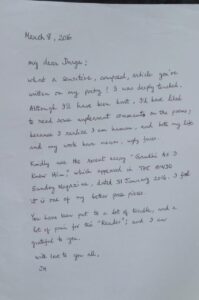
Image courtesy: Durga Prasad Panda
[I]mages, stark and meditative, loom over his literary terrain – though they appear bizarre and abstract on the surface yet symbolize some inner reality churned out from the dark depths of some invisible, hidden wound. Perhaps, this aspect of Jayanta’s poetry distinguishes him from the rest of his compatriots; his audacity to go and see beyond what is ‘given’ and to explore the ‘unseen’ with an intensely penetrating eye. Angst, agony, isolation, violence, poverty, suffering, helplessness, absurdity and his failure to escape from such grotesque vicissitudes of life provide the necessary condition, impetus and ground for his muse to flourish. And the much vaunted ‘illusiveness’ and ‘obscurity’ in his poetry is due to a ceaseless tussle between the ‘abstract’ and ‘concrete’ running into each other complementing, converging, confronting and colliding with each other much the same way as is evident in the realm of quantum physics. It would not be wrong to say that in a number of ways, Jayanta seems very much like his own poems – meditative, morose and always anxious of dark possibilities… This celebration of pain in his poems doesn’t necessarily mean that ‘pleasure’ did not exist in his life at all. Rather, in the rugged terrain of his imagination it always exists ‘elsewhere’, somewhere beyond his poetic realm; maybe in the act of ‘writing’ itself.
– Durga Prasad Panda (Durga Prasad Panda has edited the book Jayanta Mahapatra: A Reader published by Sahitya Akademi)
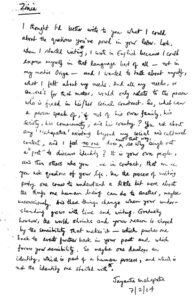
Image Courtesy: Zinia Mitra
After my co-ordination of a Bhashanagar translation workshop in Bhubaneswar with poet Subodh Sarkar, neither of us wanted to miss the opportunity to meet Jayanta Mahapatra. By way of NH 16, Cuttack was only 26.3 kilometres away. We dialed the poet’s number and were greeted by a warm and courteous voice. Jayanta Mahapatra’s house in Tinkonia Bagicha is like his poems. It has nothing extravagant about it, but all the comforts of a home. There were numerous books on the shelves, a black-and-white framed photograph of Runu Mahapatra (she was beautiful), an exclusive working table diligently maintained. First, we drank tea, and later, coconut water. We talked about poetry and periodicals. The discussion took an interesting turn. The two poets were long acquainted and caught up on many things. Jayanta Mahapatra was very enthusiastic about our translations. Mahapatra is a well-known translator and has translated several poets including Shakti Chattopadhay’s Jete Pari Kintu Keno Jabo, which I later reviewed. We could not stay for lunch because we had our return flights the same day. When I finally said goodbye to the poet whose poems were the axes of my thesis, he gave me a large box of packed Chhena Poda- special sweets of Orissa. “To Darjeeling from Orissa.” He said. I was touched by his geniality. A reader goes back to her favourite poets for different emotional and cerebral needs at different curves of her life. When I go back to Jayanta Mahapatra, what I love most today, is the stillness that is at the heart of his poems, like a stone thrown into a pond creates circles and then settles down. I had felt a similar stillness in Tinkonia Bagicha. The poet is a flâneur, himself always a little removed from the events, watching and taking snapshots of life from various angles. Most of his poems are attentive engagements to his immediate environment, to the inner movements of his mind. He attends to fleeting inner feelings that arise in him as a reaction to past or present incidents, records them and lets them pass, like a vipasana mediation before the mind goes into Samadhi. His poem “The Wave” perhaps best sums up this process:
Feel each particle of the mind
How it rises to an attitude
Before sliding down its own lift
Back where the old trembling was …
(Close the Sky, Ten by Ten)
My proximity to the poet has left me enriched manifold.
– Zinia Mitra (Zinia Mitra has written her PhD thesis on the poetry of Jayanta Mahapatra)
The Legacy
Small Rivers
– Ashwani Kumar
I like small rivers.
No furies of glacial debris
No cyclonic storms. Nothing to fear here.
They are like ripe, righteous rice crops,
Quenching hunger of starving water birds.
I remember sitting in the shade of Tamal trees
Looking into the dark doe- eyed small rivers, my hands
Impatiently touching their fleshy lips, hips, breasts.
Ah, we made love again, and again, whispering softly
In the dew-drenched migratory waters.
Small rivers are grandmother’s riddle-
Speaking local dialects of green parrots, and grey dolphins.
They spring from village wells,
Cucumber gardens or
Rat’s holes in thorny orchards.
Sometimes, they originate from the wet clay floors of
Abandoned shrines of departed sprits.
They hop over a few villages, disappear and
Suddenly re-appear along the
Shades of monsoon trail through the moist forest.
Tempted by the fragrance of lotus seeds on their
Vanishing banks, school children jump in the small rivers .
Soothe their parched skin in the fluvial innocence of
Adolescent daughters of boatmen
Playing snake and ladder in poppy-washed rippling waters.
If there is anything missing in our house
We leap into the transparent pools in the river,
Scrap the sand-dunes in the river bed and discover
Old spectacles, and water-pipes of our grand parents.
Small rivers often burn in the night like starry flash light
Illuminating rough and bumpy pavements of the village.
They knock my doors in raag Maulkauns
And I wake up in the morning like a wild flower
Blooming in the scent of my childhood.
It is no secret that I am frightened of mighty ancient rivers.
(For Jayanta Mahapatra. August 7, 2021 Parel- Mumbai)
~~~~
Ah Peace!
-Sanjukta Dasgupta
Peace is a warm shawl
Within the sunless darkness
Of the serene womb
The first flash of light
The first cry
The first touch of hands
The first violence
The snipping of the cord
Peace is as fragile as a snowflake
Peace glistens like a drop of dew
On a smiling leaf sunning itself
Peace surpasses all understanding
Peace lies at the heart of every outcry
Peace is stabbed each time
As the knife enters the heart
Peace is in splinters
As the bombs drop, guns fire
Tanks roar, missiles zoom
Drones drop precise death
With diabolic accuracy.
All is toxic everywhere
Landscapes are pregnant with landmines
The skies are darkened by the wings of vultures
The thunderous fighter planes advance like sharks
Yet compassionate peace
Is an invincible passionate warrior
That nestles at the core of being
It sprouts like leaves of grass
On the charred wastelands
Of Kurukshetra and Troy
Vietnam, Iraq, Libya,
Syria and Palestine
Peace that truly surpasses all understanding
Shanti, Shanti, Shanti!
(November 29, 2020)
~~~~
Death of A Poet
– Durga Prasad Panda
To die
Exactly in the middle
Of a poem
Is the best
Possible death
A poet could ask for
Just like
A stupefied sentence
Coming to a sreeching halt
Before the question mark.
~~~~
The Earth Tale
– Zinia Mitra
A man does not mean anything
But the place.
Sitting on the riverbank throwing pebbles
Into the muddy current,
A man becomes the place. (Jayanta Mahapatra: Somewhere My Man)
When the petrichor wanted to narrate the earth tale to me
I did not pay heed
that was right after the ants carrying their white eggs in their mouths
told me that it would rain.
I danced in the rain
unwrapping myself slowly to the unreachable indigo sky
I did not harken the tale of the earth, young that I was
the river flowed in trochee inside my body.
When I crossed the spear grass fields
which sing of the breathing winds
I was light- footed. The spikelets whispered
the earth tale but I was
obsessed with the blue rising hills
where sunlight played in light and shade
during daytime and houses came alive one by one at night.
I paid no heed to the spikelets and let them dry
and fall off
that was right after the meditating cranes flew off
and told me that many others, like me, would cross the fields .
Now, it is winter in my bones. My blood does not pulsate
in mad rhythm in my veins with the movements
of the moon. I am at home
with the iambic of
“My heart ached and a drowsy numbness … ”
Now it is time to listen to
the tale the earth had tried to convey.
To listen to the personal story of the great matriarch
one has to make a room
in the ruins of silence underneath the earth.
I carry my shovel and spade on my stooping shoulders
and walk towards the horizon
where the sun is setting slowly.
~~~~